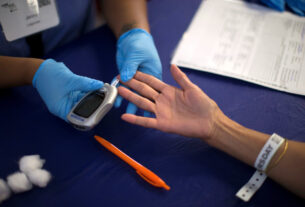The Pharmacovigilance Risk Assessment Committee (PRAS) of the European Medicines Authority (EMA) and the FDA have initiated investigations into the potential connection between weight loss injections and suicidal thoughts.
The EMA is demanding research information from manufacturers of diabetes drugs, which have gained popularity for weight loss, regarding the risk of suicidal thoughts among users who take them for weight loss purposes.
While no definitive conclusion can be drawn at this stage, the EMA has stated that several issues need further clarification.
The investigation by the EMA was prompted by reports from the Icelandic Medicines Agency, which highlighted two cases of suicide after treatment with the drug Saxenda, and one case related to the active ingredient semaglutide found in popular drugs Wegovy and Ozempic.
Moreover, the FDA has also launched an investigation into the connection between diabetes drugs used for weight loss, suicidal thoughts and suicide cases. Since 2010, the FDA has received 265 reports of suicidal thoughts among patients taking GLP-1 therapies marketed for diabetes or weight loss. Of these reports, 36 involved deaths due to suicide or suspected suicide.
Novo Nordisk, the manufacturer of Ozempic, Wegovy, Saxenda, and Victoza, submitted 180 of the reports to US regulators. Additional reports came from users of the Eli Lilly drug Mounjaro. As a result, the FDA has mandated that Wegovy include information about suicidal thoughts or attempts in its consumer leaflet, based on clinical trial reports of similar drugs.
Furthermore, the FDA recommends close monitoring of patients starting Wegovy treatment for these behaviors and advises individuals with a history of suicide attempts or suicidal thoughts to avoid the drug.
Saxenda, approved for weight loss in 2014, also carries an FDA warning due to recorded suicidal behaviors in the company’s clinical trials.
Notably, the drug Ozempic, approved for diabetes treatment in 2017, does not currently include such a warning in its drug leaflet.
However, in 2008, the weight loss drug Acomplia by Sanofi, which was not approved for marketing in the United States, was withdrawn from the European market due to its association with suicidal thoughts.
Despite these warnings, experts in obesity acknowledge that in rare cases, reduced caloric intake resulting from strict dieting or gastric surgery can lead to depression.
Hence, it is unclear whether the reported suicidal thoughts and cases are directly linked to the active ingredients in the drugs or if they are a result of these weight loss methods inducing depression.
GLP-1 treatments have gained popularity in recent years among those seeking weight loss as they induce a feeling of fullness after eating and slow gastric emptying.




